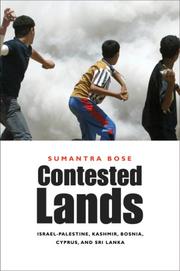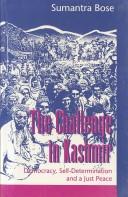| Listing 1 - 4 of 4 |
Sort by
|

ISBN: 9780674024472 0674024478 0674028562 9780674028562 Year: 2007 Publisher: Cambridge, Mass. Harvard University Press
Abstract | Keywords | Export | Availability | Bookmark
 Loading...
Loading...Choose an application
- Reference Manager
- EndNote
- RefWorks (Direct export to RefWorks)
The search for durable peace in lands torn by ethno-national conflict is among the most urgent issues shaping our global future. Looking at the recent and current peace processes in Israel-Palestine, Kashmir, Bosnia, Cyprus, and Sri Lanka Bose addresses the question of how peace can be made, and kept, between warring groups with seemingly incompatible claims.
Peace --- Ethnic conflict --- Conflict management --- Paix --- Conflits ethniques --- Gestion des conflits --- Case studies. --- Cas, Etudes de --- Conflict, Ethnic --- Ethnic violence --- Inter-ethnic conflict --- Interethnic conflict --- Coexistence, Peaceful --- Peaceful coexistence --- Ethnic relations --- Social conflict --- International relations --- Disarmament --- Peace-building --- Security, International --- War

ISBN: 0803993501 Year: 1997 Publisher: London Sage
Abstract | Keywords | Export | Availability | Bookmark
 Loading...
Loading...Choose an application
- Reference Manager
- EndNote
- RefWorks (Direct export to RefWorks)
812 Ideologie --- 813 Methodologie --- 815 Geschiedenis --- 821 Internationaal Recht --- 821.1 Volkenrecht --- 821.5 Mensenrechten --- 841 Politiek Bestel --- 841.1 Democratisering --- 844.1 Minderheden --- 845 Religie --- 846.1 Etniciteit --- 851 Burgeroorlogen --- 856.1 Conflictpreventie --- 856.3 Conflictbemiddeling/Onderhandelingstechnieken --- 883.5 Zuid-Azië
Book
ISBN: 8178293285 9788178293288 Year: 2003 Publisher: New Delhi Vistaar Publications
Abstract | Keywords | Export | Availability | Bookmark
 Loading...
Loading...Choose an application
- Reference Manager
- EndNote
- RefWorks (Direct export to RefWorks)
Jammu and Kashmir (India) --- Pakistan --- India --- History --- Politics and government --- Foreign relations --- Jammu (India : State) --- Kashmir and Jammu (India) --- Jammu and Kashmir --- Jammu & Kashmir (India) --- Jammun̲ o Kashmīr (India) --- Dzhammu i Kashmir (India) --- Kashmir (India) --- Jammoo and Kashmir (India) --- Kaśmīra (India)
Book
ISBN: 1108559468 1108611494 1108472036 Year: 2018 Publisher: Cambridge : Cambridge University Press,
Abstract | Keywords | Export | Availability | Bookmark
 Loading...
Loading...Choose an application
- Reference Manager
- EndNote
- RefWorks (Direct export to RefWorks)
A pioneering comparative study of the two major attempts to build secular states - where the state's constitutional identity and fundamental character are not based on or derived from any religious faith - in the non-Western world. This book explains the origins, evolution and latterly the decline of secularism as a core principle of the state in India and Turkey. The anti-secular political transformations of the twenty-first century are the rise of a Sunni-Islamist definition of Turkish national identity to hegemonic power, and Hindu nationalism as India's pre-eminent political force. Both secular-state models adopted a similar operational doctrine of state intervention in and regulation of the religious sphere, rather than a Western-style separation of church and state. But, Turkish state-secularism took a culturally deracinated and harshly authoritarian form that led to its failure, whereas India's secular state - though flawed in practice - followed a culturally rooted and democratic path that makes secularism indispensable to India's future.
Secularism --- Religion and politics --- Hinduism and state --- Islam and state --- Mosque and state --- State and Islam --- State, The --- Ummah (Islam) --- Political science --- Politics, Practical --- Politics and religion --- Religion --- Religions --- Ethics --- Irreligion --- Utilitarianism --- Atheism --- Postsecularism --- Secularization (Theology) --- Political aspects --- Religious aspects --- India --- Turkey --- Politics and government
| Listing 1 - 4 of 4 |
Sort by
|

 Search
Search Feedback
Feedback About UniCat
About UniCat  Help
Help News
News